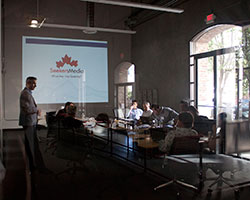This June, Jim Barr left his office at novaNAIT, the institute’s centre for applied research and technology transfer, for a whirlwind trip to foggy San Francisco, California. For the web-based media entrepreneur, it had the potential to seriously ramp up operations.
The Bay Area and Silicon Valley remain the mecca of high-tech, populated by giants like Apple, Google, HP and more. But, most importantly to Barr, the region is home to a group of Canadian entrepreneurs and investors called the C100, host of 48hrs in the Valley, a boot camp with the power to transform a startup into a multimillion-dollar concern.
As head of one of 20 Canadian companies (and the only one from Alberta) accepted to that event, Barr’s dreams suddenly seemed within reach.
The president of Seekers Media Inc. is, in almost all ways, a typical entrepreneur. Barr is outgoing and optimistic to a point nearing mania. He’s driven as much by risk as ambition. He’s used to relentless uncertainty and stress, and he’s comfortable with being, at 38, greyer than most people his age.
For novaNAIT’s entrepreneur in residence and Seekers Media adviser Randy Thompson, it was Barr’s tirelessness and knack for multitasking that earned him a spot in 48hrs: “Those things are essential if you’re going to take a company to market quickly.”
On top of all this is the fact that Barr, a tenant of novaNAIT’s business incubator (the Duncan McNeill Centre for Innovation) always has a next step in mind.
Having established two brands – SnowSeekers, the online and mobile guides to winter activities (including his beloved snowboarding), and, following a similar vein, the recently launched FestivalSeekers – Barr was eager for a foothold in California, its population of more than 37 million enough to convince most entrepreneurs of a rich return.
Pitching to the C100, and the possibility of impressing potential investors, was a means to that end. Growth for Seekers Media had been steady but “bootstrapped”: slow, hard-won and mostly self-financed. Things were about to change. And they did – just not exactly how he expected.
This is how Barr’s trip to one of the world’s hottest spots for business unfolded.

Day 1, 12:35 p.m.
Barr sits in the departure lounge at Edmonton International Airport in a blue blazer and jeans. Between checking texts, he muses about an ideal, post-San Fran future for Seekers Media. He’s nervous, but “so stoked.”
“The nerves are in the unknown,” he says. “There’s so much here that could totally change us and take us to some outstanding heights.”
Previously, the plan was to grow into Eastern Canada. No, advised one venture capitalist. Go south. Improve your market by an easy five to 10 fold.
So now Barr asks, his mind fixed on the Golden State, “What happens when SnowSeekers Tahoe comes into play?” He points out how his model, built out in Alberta and British Columbia, is proven: roughly 100 clients, a handful of shareholders and revenues surpassing $605,000 since inception in January 2009. “Take that and put it into California, and allow the markets to cross-pollinate.”
To him, it’s all but reality. “It’s not a question of if for us but a question of when,” he says in the minutes before boarding.
Roughly three hours later, as the plane descends to San Francisco International, Barr unbuckles and jumps across the aisle for the view of the city as the wing tips earthward.
Day 1, 3:15 p.m.
At the airport, shortly before the first 48hrs event, Barr distills his goals. The trip is an opportunity to make connections, but “we need some capital,” he says bluntly. “I’m tired of bootstrapping. I’ve spent so much energy watching my bank account.”
He recalls a pitch he made in Calgary that didn’t generate a single dollar, but less to bemoan it than to upend it as motivation. He boards a train for downtown San Francisco without hesitation, as if it’s a subway back home, and mulls over his business plan for the upcoming pitch, less than a day away.
Seekers Media’s “secret sauce,” he says, is scalability: spa-seekers, zen-seekers, retirement-seekers, on and on. He smiles at the possibilities.
Later, checking into his hotel, he presses the clerk, unsuccessfully, for a discount. “When you’re starting a business,” Barr says, “you’ve always got to be wheeling and dealing.”

Day 1, 5:19 p.m.
“I understand the networking game,” says Barr, “but what doors are out there that we as a company don’t even know exist?” At the 48hrs welcome mixer, held at a lively bar in a slightly shabby part of town, he starts investigating.
Free food and drinks fuel conversation between company execs invited from across Canada. The average age might be 30; male is the gender best represented. The place is packed. A DJ spins vinyl. The air doesn’t move. Still in his blazer, Barr is one of the few attendees sporting semiformal.
“I thought you were a VC!” Roy Pereira tells him. The Toronto-based CEO and founder of Shiny Ads, a company dealing in online advertising, means venture capitalist, or potential funder. He masks disappointment with a smile. “Only VCs wear jackets,” he persists. “Come on. This is California.”
Barr moves on. He’s blessed with a personality that allows him to wade into conversations like they’re open water, but he’s still relieved by the casual atmosphere. “It’s a little more chill than I expected,” he says. “Instead of it being, ‘Let’s talk about your business,’ it’s, ‘Let’s talk about surfing.’ I’m good with that.”
C100 member Debbie Landa is also making the rounds and, as CEO of Dealmaker Media, connector of startups and leading business executives, the Saskatoon native sees the event differently.
“If you have the luxury of being here, use it to the full potential,” she says. “Be direct. Let go of that Canadian chitchat and get down to business.”
But lengthy commiseration remains a popular activity. Sandy Gibson, co-founder of ConnectedN, focuses on the fundamental challenge of how to raise capital, specifically for his business-to-business marketing platform.
“Dude, if we all knew that, we wouldn’t be in this room right now,” Barr tells him.
Nevertheless, Barr will leave the event upbeat. “A lot of this is about expanding the Rolodex,” he says out on the street. “That’s the value of being in an incubator like the Duncan McNeill Centre for Innovation. How would I have heard about this event otherwise?”
The C100
Canadian Chris Albinson likes to refer to his community of fellow expats in California’s Silicon Valley as “the lost province.” One reason is size: an estimated 300,000 of us live and work in the region. Another may be that it’s a community that remembers where it came from – at least if the C100 is any indication.
Formed by Albinson less than two years ago with Anthony Lee, a general partner at technology venture capital company Altos Ventures, the C100 was a response to the global downturn and modelled after the successful efforts of India and Israel in marketing their entrepreneurs in the United States. The same should be done, they figured, for Canadians. So, they invited 98 other top Canadian execs and investors to be charter members of the non-profit organization.
“We felt we owed a lot to Canada,” says Albinson, a
veteran investor in startups.
Today, the C100 supports entrepreneurs from back home with events like 48hrs in the Valley, a boot camp that connects Canadians to business in the region. Since inception, the group has brought down more than 110 entrepreneurs, seen roughly $180 million raised and two C100 companies exit – one, social media monitor Radian6, selling for $326 million.
But for Albinson, success isn’t measured in millions. Mostly, C100 is about building a better entrepreneurial community and meeting a need for mentoring and business development. “It brings everyone up a level.”
He pauses, his mind backtracking to conversations of minutes earlier. “God,” he says. “How much money do you have to raise before you start actually making it?”
Day 2, 9:21 a.m.
Barr starts the first of the morning’s two mentoring sessions in a tiny office at RocketSpace, which offers shared office space for tech startups. Gibson of ConnectedN shares the time. Early stage adviser Michael Buhr plays mentor, bringing experience as former CEO of StumbleUpon and senior director of corporate strategy at eBay.
SnowSeekers arose from the combination of his past as a journalist and marketing and sales jobs in tourism, Barr explains, and from an abandoned book deal. Terms included a slim royalty of seven per cent on a $29 book and no ownership of content. Basically, he tells Buhr, “the guidebook went fully digital” as the SnowSeekers mobile apps.
Buhr likes the concept, but wonders if it’s truly ready to move into California. Barr listens quietly.
“My gut feeling is to find a way to build it out before you expand somewhere else,” says Buhr. “Why take the risk when you have so much opportunity to expand in Canada?”
“But can I do both?” asks Barr.
Buhr isn’t convinced. “Maybe we revisit this a
year from now.”
Just before the focus turns to ConnectedN, Gibson considers SnowSeekers’ competition. “The thing that’s not being done well is content. You can do that,” he tells Barr.
At the second round, mentor Dan Martell takes Barr and session-mate Pereira of Shiny Ads to a nearby café.
The co-founder of Flowtown, a social marketing platform for small businesses, takes a more general approach than Buhr, peppering his pair with advice: be brutally honest about risk with your earliest investors; limit the time-suck of raising capital by raising more from fewer sources; generously valuate your company; talk to veterans in your field. Then he asks if he can be of any more help.
“Uh, introductions to VCs would be good,” says Pereira.
Regarding SnowSeekers, Martell does get specific about California: forget it – for now. Capitalize instead on the proximity of Washington and Montana. “The [market] overlap is what gives you that competitive advantage,” says Martell.
Though Barr understands the value of all the advice he has received, he seems overwhelmed by it, even disheartened. In fact, a few hours from his pitch, his optimism has eroded significantly. He’s distracted and unsmiling. He needs to refine his presentation.
“I know I’m going to get eaten alive by the VCs,” he says before disappearing to work. He shrugs, willing himself as quickly as possible into a state of acceptance. “But it is what it is.”

Day 2, 3:30 p.m.
Barr’s pitch, in an office near the San Francisco waterfront, keeps to the seven minutes allotted by organizers.
Attending are a handful of other entrepreneurs, along with dealmakers Chris Albinson, C100 co-founder and a managing director at Panorama Capital, investor in life sciences and technology companies; Ron Warburton of the Business Development Bank of Canada (BDC); and Export Development Canada’s (EDC) Pascal Britt-Côté.
Barr wasn’t quite right about being eaten alive. The atmosphere is relaxed and supportive, the tension rising only mildly when Albinson questions some of Barr’s growth projections: “I’ve been in this business for 20 years,” he says, “and you don’t see companies with that kind of profitability, ever.”
But Barr correctly anticipated the conclusion: no one considers Seekers Media “VC-backable”– at least at this stage.
As VCs, says Warburton, “We’re looking for world-changing technology. The average investor is looking for a 10-times return. That is the reality.” But still, the BDC managing director of venture capital is impressed. “I think you’ll do really well,” he tells Barr. “You can still have a very good, profitable business.”
Barr brightens. “I’m okay with that.”
Britt-Côté, as EDC information and communication technology senior associate, suggests Barr should be in touch about his Washington and Montana plans.
But it’s Albinson’s final comments – cautious but encouraging – that lift the clouds from Barr’s horizon. “There’s a signal there,” he says of Seekers Media. “There’s a heartbeat. Is it going to be a winner of the 100-yard dash? It’s too early to say.”
For Barr, that’s enough. The feedback session ends and he gathers his presentation materials. “When a guy like Chris says you’ve got something?” he says. With that, he’s smiling again.
Jim Barr's Startup Tips
- “Don’t be afraid to talk to people about your idea. Carefully pick your allies and talk it through.” Feedback from like-minded entrepreneurs is essential; don’t fret too much about losing your intellectual property.
- “Figure out how you’re going to pay for everything.” It sounds obvious, but whatever you do, it’s going to cost far more money – and take more time – than you’ve budgeted.
- “Just keep moving.” The only direction is forward, and evolution is only possible with momentum. Never rest.
That night, back at RocketSpace for snacks and drinks, Roy Pereira’s reflections on the day turn philosophically toward the life of the entrepreneur. “You’re a gambler,” he says, “but hopefully you’re counting cards. Or at least you have some understanding of the game.”
Certainly, Barr’s understanding has changed, and grown, thanks to the C100. The next day, before leaving San Francisco, he would meet informally with prospective investors and come away not with a cheque but with connections he’d see as nearly as valuable.
Regardless of whether those lead one day to cash, those meetings represent the kinds of “doors” that, back at that first 48hrs mixer, Barr hoped might open for Seekers Media. And even with no certain end to the bootstrapping that brought the company to San Francisco, he gave the impression that even knocking on them – if not getting a foot in – had offered a better view of his future.
“I don’t feel the same,” he said, just hours before leaving for Edmonton. “I feel so much bigger and enthusiastic. I’m so excited to get back to Alberta.”
Randy Thompson’s view of the future for Seekers Media is also optimistic, at least within certain parameters. “Is Jim going to be a global media brand? Probably not,” says the serial entrepreneur. “But is he going to be the leader in his space? Absolutely.”
Barr is fine with that. “All of a sudden we’re a billion-dollar business and I can’t go snowboarding as much anymore.”
But he knows that even becoming a multimillion-dollar business is going to take work, along with a new plan. California’s on the back-burner, but Washington and Montana are new priorities – after tightening his focus on the local market by seeking investment back home to finance two new positions: a business development officer and a chief technology officer.
“What we do now is make sure this is the best product we can make it,” says Barr. “Are we there yet? No.
“But we will be.”
NAIT and Seekers Media
Besides connecting Seekers Media to the C100 through novaNAIT, the institute’s centre for applied research and technology transfer, NAIT faculty, staff and students have supported the company since September 2009, when Jim Barr became a tenant of the Duncan McNeill Centre for Innovation.
Members of the Department of Teaching and Academic Development, for example, initially built the core technology for its mobile apps, and students and instructors from Digital Media and IT (DMIT) helped produce Sunny on the Slopes, a short film about a Mongolian girl’s efforts to learn to ski.
Recently, Seekers Media again turned to DMIT for assistance. Students developed a system that allows event organizers, advertisers and Barr’s staff to upload information to the Seekers Media sites. Going forward, Barr would like to see more partner projects.
“It’s a win-win,” he says. “It’s an opportunity for us to get a solution we need, and it’s obviously an opportunity for students to get some real-world experience.”